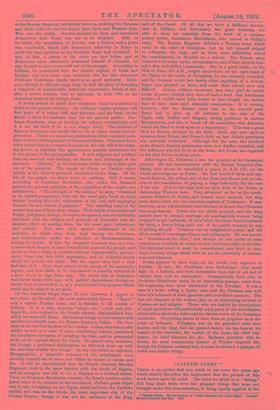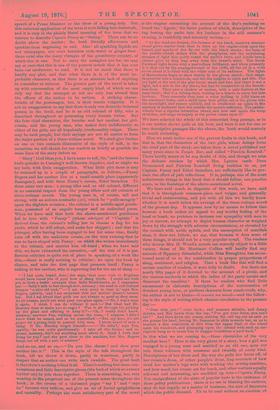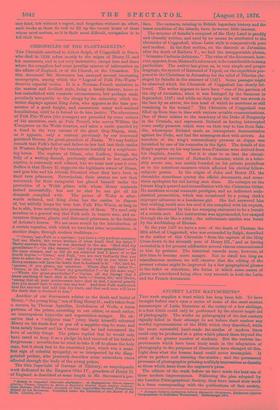"CAPTAIN FANNY."
THERE is an epithet that was much in use some few years ago which exactly describes the impression that the perusal of this work leaves upon the mind. The word we allude to is "flaring." Not long since there were few pleasant things that were not brought under this denomination, it being equally applied to the • Captain Army. By the Author of "John Holdewortb, Chief Mate." London: Richard Bentley and SOC. 1876.
speech of a Prime Minister or the dress of a young lady. But this universal application of the term is now falling into desuetude,
and it is only in the plainly literal meaning of the term that we venture to describe Captain Fanny as "fizzing." There can be no
doubt about the matter ; the book literally effervesces and ' sparkles from beginning to end. Alas ! all sparkling liquids are not champagne, nor even harmless soda-water or ginger-beer ; there exist also the many vintages of the gooseberry country, of which this is one. Not to carry the metaphor too far, we may say at once that this is one of the poorest novels that it has ever • been our misfortune to read. It is not so much that there is hardly any plot, and that what there is is of the most im- probable character, as that there is an absolute lack of anything • to remember or interest. The greater part of the novel is taken up with conversation of the most empty kind, of which we can only say that the attempts at wit are only less absurd than the efforts of the author to be serious. A striking charac- teristic of the personages, too, is their innate vulgarity. It is not an exaggeration to say that there is only one decently-behaved person in the book, and he is an -old colonel of fifty, who is described throughout as possessing every human virtue. But the four chief characters, the heroine and her mother, her girl- - cousin, and the young man, who makes love indifferently to either of the girls, are all hopelessly, irredeemably vulgar. There may be such people, but their sayings are not fit matter to form the major portion of a three-volume novel. We shall give further on one or two extracts illustrative of the style of talk, in the meantime we will sketch for our readers as briefly as possible the main lines of the story before us.
• " Story ! God bless you, I have none to tell, Sir," said the famous knife-grinder in Caaming's well-known Supplies, and so might we say here, with little exaggeration. What little plot there is may be summed up in a couple of paragraphs, as follows,—Fanny Rogers and her mother live at a small seaside place (apparently Ramsgate), and with them Fanny's cousin, Ethel Saunders. To them enter two men ; a young idler and an old colonel, different in no essential respect from the young idlers and old colonels of three-volume novels. The young man is, of course, tall and strong, with an auburn mustache (sic), which he "pulls savagely" upon the slightest occasion ; the colonel is a middle-aged gentle- man, possessed of an angelic temper and an unlimited purse.
When we have said that both the above-mentioned gentlemen fall in love with " Fanny " (whose sobriquet of "Captain" is derived from the colonel's telling her to choose a flag for his yacht, which he will adopt, and make her skipper) ; and that the younger, after having been engaged to her for some time, finally runs off with the malicious cousin, on the very evening that he was to have eloped with Fanny ; on which she writes immediately to the colonel, and marries him off-hand ; when we have said this, we have exhausted the narrative,—all the rest of it is gas. Serious criticism is quite out of place in speaking of a work like this,—there is really nothing to criticise ; we open the book by chance, and take the first page that presents itself ; Fanny is talking to her mother, who is reproving her for the use of slang :—
" I had quite hoped, dear,' she says, that your visit to Brighton would have cured you of your love of slang words. I could not wish you to have a better example than Sally Buttlebanks, as I remember her.'--4 Sally's talk is fast enough now, mammy; she used to call Colonel Swayne "a nice old cock."-4 I am very sorry to hear it,' says Mrs. Rogers, quickly, ' and I am surprised that her mother doesn't correct her. But I am afraid that girls are not always so good as they seem. At all events, you'll not wear your eye-glass again.'—' No, I won't wear it again. I think I can do without it now.'—' But what had Mr. Huntley done to make you so angry ? Was it all through his picking up the glass and offering to keep it ?'-4 Oh, I really don't know, mammy,' answers Fan, walking across the room, '1 suppose I didn't know what he meant, and so we quarrelled.'-4 But, my dear, its not proper for a young lady to quarrel with won. I never heard of such a thing. If Mr. Hantley forgot himself—'—' He didn't,' says Fan, rapidly, he was quite gentlemanly. I take all the blame ; and so, please, mammy, don't say anything more about it. Shall I work that thing for you?' and she goes close to the machine, but Mrs. Rogers keeps her off with a pair of scissors."
And so on, and so on,—" Do you like cheese ? and does your mother like it ?" This is the style of the talk throughout the book, till we throw it down, partly in weariness, partly in despair that an author can write such twaddle. The great fault is that there's nothing behind it all. There's nothing but these con- versations and little descriptive pieces (the best of which we extract further on) to join them together. There is something, too, very wearing in the perpetual use of the present tense throughout the book ; in the course of a thousand pages "say I" and "says he" become very tedious, and give an air of forced sprightliness and unreality. Perhaps the most satisfactory part of the novel is the chapter containing the account of the day's yachting on board the Egeria,' the latter portion of which, descriptive of the tug towing the yacht into the harbour in the still summer's evening, is truthfully and minutely written :—
" As the shadows deepen, the furnace of the black, shadowy steamer ahead glows scarlet from time to time up the engine-room upon the funnel, and sparks of fire fly out with the black smoke ; the foam of the paddle-wheels shines with the phosphorus, and the undulating streams of light hiss scaly round the yacht's bows, and kindle intcea clearer glow as they leap away from the vessel's aides. The South Foreland light burns with a marvellous brilliancy, and when presently it is shut out by the coming-forward of the cliffs, all the air in a wide circle about it is filled with the white mist of its radiance. The lights of Havenstown begin to show clearly in the gloom ahead ; they range themselves into a semicircle, and dot the heights to right and left. The red light at the end of the pier burns small and fine, and there is not a light, not a star in the sky above, but has its counterfeit in the breath- less deep. They pass a shadow at anchor, with a pale lantern at the mast-head ; this is a fishing-boat, waiting for a breeze to carry her into. harbour. Then presently they hear a voice trolling in jolly tones on the starboard beam, and a small open boat glides out of the gloom into. the moonlight, and passes quickly, and is swallowed up again in she mystery of darkness that lies outside the moon's reflection. The paddle- wheels beat a regular intonation ahead, and now and again the wasp stretches, and sings strangely as the power comes upon it."
We have selected the whole of this somewhat long passage, as in it our author shows quite at his best, and were it not for one or two descriptive passages like the above, the book would scarcely be worth reviewing.
Here we must notice one of the gravest faults in this book, and that is, that the characters of the two girls, whose doings forsa
the chief part of the story, are taken from a novel published not many years since in Temple Bar, and called "Patricia Kemball."- There hardly seems to be any doubt of this, and though we miss.
the delicate strokes by which Mrs. Lynton made Dora Drummond and Patricia Kemball living realities to us, yet Captain Fanny and Ethel Saunders, are sufficiently like to pro- duce the effect of pale reflections. It is, perhaps, one of the most unfortunate things in this book that it should follow, non passibua mquis, in the footsteps of the above-mentioned novel.
We have said much in dispraise of this work, we have said,
that it its throughout common-place and vulgar, and generally trivial and uninteresting, and yet with all this we hardly know whether it is much below the average of the three-volume nova of the present day. It appears now by no means to follow that because a book makes no appeal to any worthy feeling of the head or heart, no pretence to increase our sympathy with men in joy or sorrow, no attempt to depict human character as weighed down by the struggle with adverse circumstances, or elevated by the contact with noble spirits, and the assumption of unselfish aims, it does not follow, we say, that because it does none of these things, it should not be a very popular noxeL The readers. who devour Mrs. H. Wood's novels can scarcely object to a little variety, those of Mr. Mortimer Collins will hardly find any amount of flippancy distasteful, while Miss Broughton has accus- tomed most of us to the combination in proper proportions of slang, sentiment, and religion. That a book like this will find a. certain number of readers, it were folly to doubt. Are there not nearly fifty pages of it devoted to the account of a picnic, and the various methods in which the ladies of the party mount and dismount the omnibus ? If there be readers who find little amusement in elaborate descriptions of the conversation of drunken young men, or perilous descents from coach-roofs, wby, the author is not to blame—i/ commit son monde—and the follow- ing is the style of writing which obtains circulation in the present day :—
" Over with you!" cries Jack ; and mamma shrieks, and Jenny shrieks, and Mat bawls from the top, "rye got your dress, you can't fall !" And then down she comes, making the cad rap out an oath as she grasps his head, forcing Mr. Sampson to slide towards her, so as te impress a fine semicircle of dirt from the upper limb of the wheel upon his waistcoat, and plumping upon the colonel with such an out- rageous bang as to cause him to stagger breathless a yard back."
Is this what we are coming to,—these chronicles of the very smallest beer? Here is the very ghost of a story, how a girl was. engaged to a young man and married to an old one, spun out into three volumes with nonsense and twaddle of every kind. Descriptions of her dress and the way she pulls her boots off,, of her cousin's dress, of other people's dress, long accounts of how tired her mother's legs were with working the sewing-machme, and how much her cousin eat for lunch, and other matters equally relevant and interesting, are muddled up into—Captain Fanny. Not unsignificant of the state of popular taste is the existence of these paltry publications ; there is no use in blaming the authors, they do but supply, as a matter of business, the sort of literature which the public demand, Fit to be read without an emotion- of any kind, left without a regret, and forgotten without an effort, such books as these do well to fill up the vacant hours of those whose most serious, as it is their most difficult, occupation is to kill their time.
































 Previous page
Previous page